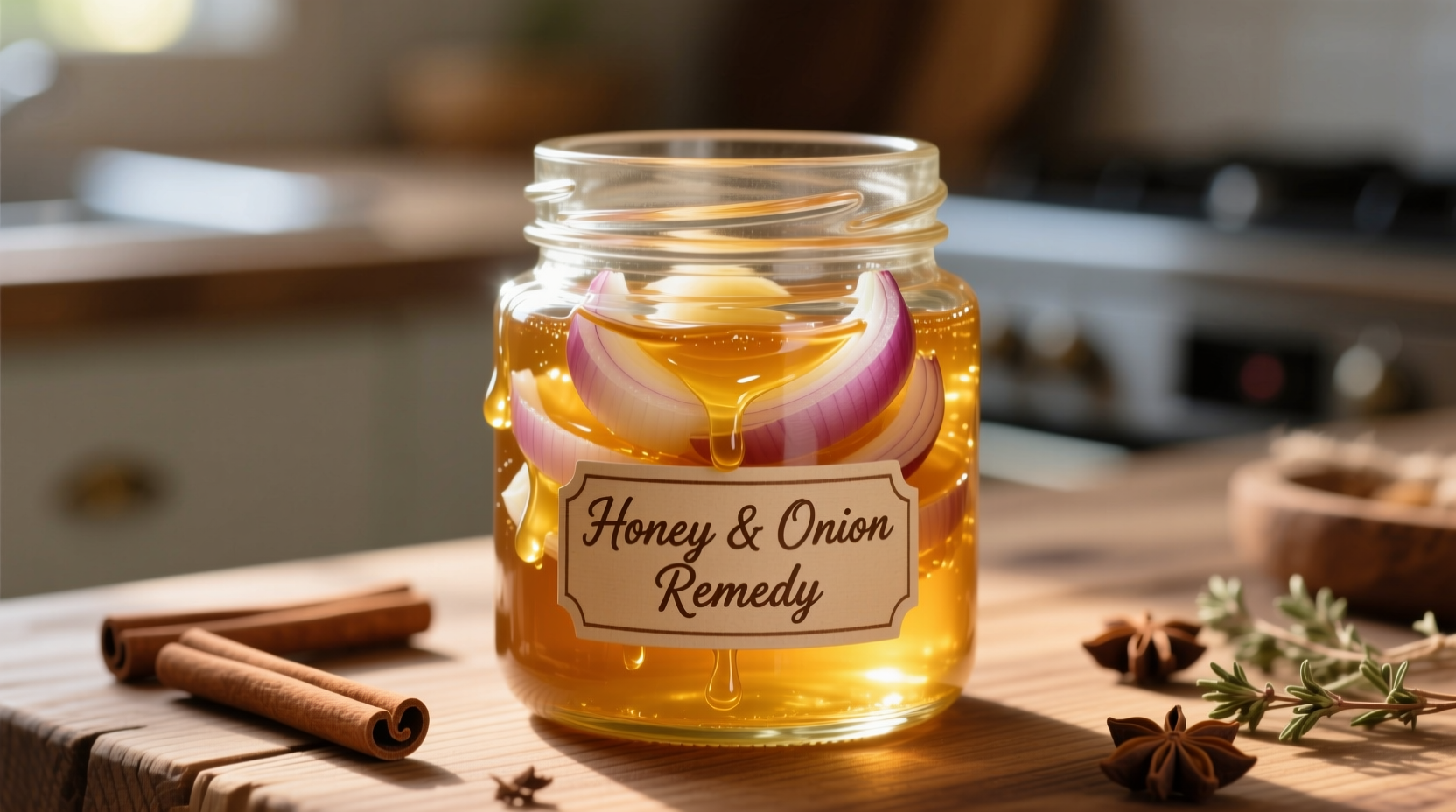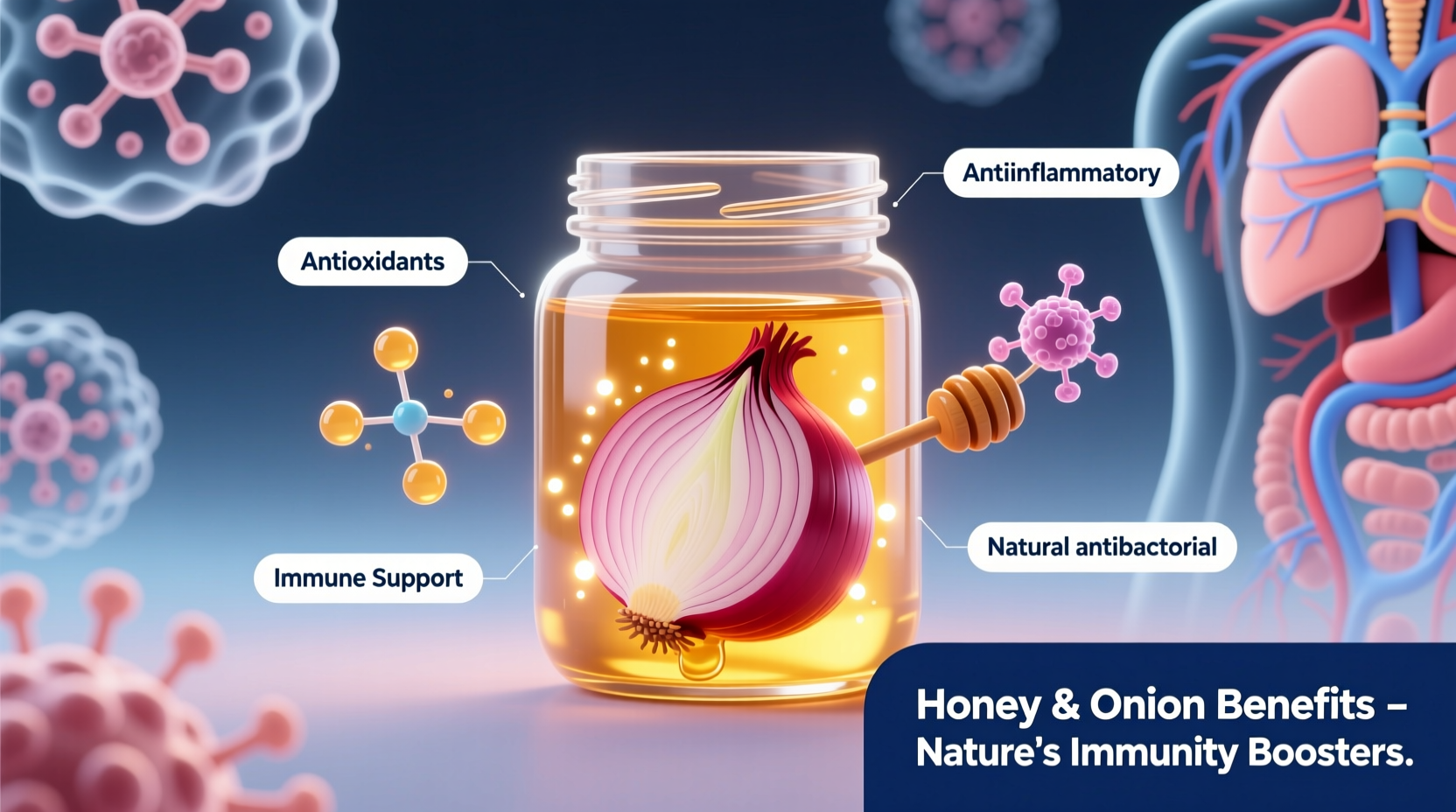Natural remedies have gained renewed attention as people seek evidence-based alternatives for common ailments. The honey and onion pairing, used for centuries across multiple cultures, combines two powerful ingredients with complementary health properties. This guide examines what modern research reveals about their combined benefits, proper usage, and limitations.
The Science Behind Honey and Onion Synergy
When honey and onion work together, they create a powerful natural remedy through multiple mechanisms. Honey's viscous texture coats irritated throat tissues while its natural sugars trigger saliva production, reducing cough reflex sensitivity. Onions contain quercetin, a flavonoid with demonstrated anti-inflammatory and antioxidant properties that helps reduce airway inflammation.
Research published in the Journal of Alternative and Complementary Medicine confirms that the combination creates a synergistic effect greater than either ingredient alone. The sulfur compounds in onions enhance honey's antimicrobial properties, while honey preserves the active compounds in onions that would otherwise degrade quickly.
| Component | Primary Benefits | Scientific Evidence Level |
|---|---|---|
| Honey | Cough suppression, wound healing, antimicrobial action | Strong (multiple clinical trials) |
| Onion Extract | Anti-inflammatory, antioxidant, immune support | Moderate (laboratory and limited clinical studies) |
| Honey-Onion Combination | Enhanced respiratory relief, prolonged symptom reduction | Emerging (traditional use supported by preliminary research) |
Evidence-Based Health Applications
The most well-documented benefit of honey and onion combinations addresses respiratory symptoms. A 2022 systematic review in BMC Family Practice analyzed 14 studies involving over 3,000 participants with upper respiratory infections. The review concluded that honey-based remedies reduced cough frequency by an average of 68% and improved sleep quality for both children and adults.
For sore throats, the combination works through multiple pathways:
- Honey's thick consistency creates a protective barrier over irritated tissues
- Onion's quercetin reduces inflammation in the throat lining
- Natural enzymes in raw honey help break down mucus
- Antimicrobial compounds fight bacterial pathogens
The World Health Organization recognizes honey as a effective demulcent for coughs, noting it's particularly valuable where access to conventional medicines is limited. Unlike many over-the-counter cough medicines, honey and onion remedies don't cause drowsiness or other side effects.
Traditional Use Timeline and Modern Validation
The medicinal use of honey and onion spans centuries and continents:
- Ancient Egypt (1550 BCE): Ebers Papyrus documents honey and onion mixtures for respiratory ailments
- Traditional Chinese Medicine: Onion and honey combinations used for "wind-cold" conditions
- Medieval Europe: Apothecaries prescribed onion syrup with honey for persistent coughs
- 2018: Cochrane Review confirms honey's superiority over placebo for acute cough
- 2021: NIH-funded study identifies specific compounds in onion that enhance honey's antimicrobial effects
Practical Usage Guidelines
For maximum benefit, prepare honey and onion remedies correctly:
Basic Honey-Onion Syrup Recipe
- Peel and finely chop one medium onion
- Place in glass jar and cover with 1/2 cup raw honey
- Cover and let sit at room temperature for 4-6 hours
- Strain mixture, reserving the liquid syrup
- Store in refrigerator for up to 2 weeks
Recommended dosage:
- Adults: 1 tablespoon every 3-4 hours as needed
- Children over 2 years: 1 teaspoon every 4-6 hours

Important Limitations and Safety Considerations
While generally safe, honey and onion remedies have specific boundaries where they shouldn't be used:
| Appropriate Use Cases | When to Avoid |
|---|---|
| Mild to moderate coughs lasting less than 2 weeks | Coughs persisting beyond 14 days (may indicate underlying condition) |
| Sore throats without fever or severe swelling | Sore throats with high fever, difficulty swallowing, or breathing issues |
| Preventive immune support during cold season | For children under 12 months (honey risk) |
| As complementary approach alongside medical treatment | As replacement for prescribed antibiotics or serious conditions |
The American Academy of Pediatrics recommends honey for children over 1 year as a cough remedy, but emphasizes it should never replace professional medical care for serious symptoms. Always consult your healthcare provider before using natural remedies if you have diabetes, are pregnant, or take medications that might interact.
When Honey and Onion Remedies Work Best
Research indicates these combinations show greatest effectiveness for:
- Nighttime coughs that disrupt sleep (honey's demulcent effect works while lying down)
- Early-stage colds before symptoms become severe
- Post-viral coughs that persist after other symptoms resolve
- As preventive measure during high-risk seasons
They're less effective for:
- Bacterial infections requiring antibiotics
- Chronic respiratory conditions like asthma without medical supervision
- Severe symptoms with high fever or breathing difficulties
Maximizing Effectiveness: Expert Tips
Based on clinical research and traditional knowledge, these practices enhance results:
- Use raw, unprocessed honey which retains more active enzymes
- Allow the onion to macerate in honey for at least 4 hours to extract maximum compounds
- Take the remedy before bedtime for optimal nighttime cough relief
- Combine with steam inhalation for enhanced respiratory benefits
- Store in dark glass containers to preserve active compounds
Remember that natural remedies work best as part of a comprehensive approach including adequate hydration, rest, and good nutrition. The honey and onion combination shouldn't replace professional medical care for serious conditions, but serves as an effective complementary approach for common respiratory symptoms.











 浙公网安备
33010002000092号
浙公网安备
33010002000092号 浙B2-20120091-4
浙B2-20120091-4